PFC Lokomotiv Plovdiv
 | |||
| Full name | Professional Football Club Lokomotiv 1926 Plovdiv | ||
|---|---|---|---|
| Nickname(s) |
Smarfovete (The Smurfs) Zheleznicharite (The Railwaymen) | ||
| Founded | 25 July 1926 | ||
| Ground | Lokomotiv, Plovdiv | ||
| Capacity | 13,000 | ||
| Owner | Hristo Krusharski | ||
| Chairman | Hristo Bonev | ||
| Head coach | Voyn Voynov | ||
| League | First League | ||
| 2016–17 | First League, 5th | ||
| Website | Club website | ||
|
| |||
Lokomotiv (Bulgarian: Локомотив) is a Bulgarian professional association football club based in Plovdiv, that competes in Bulgaria's primary football competition, the First League. Lokomotiv's home ground is the homonymous Lokomotiv Stadium situated in the Lauta park of the city, with a capacity of 10,000 spectators.
Established in 1926, in the 2003–04 season of the A Group, Lokomotiv became champions of Bulgaria, finishing the season with three points more than the second-ranked, Levski Sofia. Lokomotiv Plovdiv have also won one Bulgarian Supercup and one Cup of the Soviet Army in 1983. The club's biggest success in Europe is reaching the third round of the Inter-Cities Fairs Cup in 1965, after losing to the Italian Juventus F.C. in a play-off match.
History
Description of the club's history requires attention to the reorganisations that the team has undergone since its creation and how the members and fans of the team have reacted to these changes. It should be noted that the political environment in Bulgaria during the communist period between 1944-1989 has led to some forced changes in the nature of sporting clubs throughout the country as to follow "the Soviet model". In the case of PFC Lokomotiv Plovdiv, these changes have led to the merger of two teams, that are different in nature, leading to misinterpretations of the history of the teams. This said, a special approach is needed towards the history of the early years of the contemporary football club of Lokomotiv Plovdiv. In order to understand the origin of the contemporary team with its official full name, colours, and supporters, the examination of Lokomotiv's history has to be undertaken in two major "branches" - one defined by its followers and recognisable features, and the other by its functional characteristic and funding as a labour union team. These branches can be defined as that of Sportclub Plovdiv (being the fan-based team), and of club of the railway workers (being the team funded by the union).
Roots of the Club (until 1944)
Sportclub Plovdiv
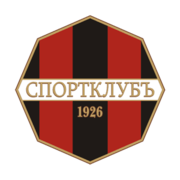
In the spring of 1922 the sport club Karadzha is founded administratively by the consolidation of some casual football teams in one of the districts of the city of Plovdiv so that the players can compete in the Championship of Plovdiv. Two years later, in 1924, the sport club Atletik is formed in the same district of Plovdiv as Karadzha.
On 26 July 1926 the two sport clubs from the same district, Karadzha and Atletik, unite to form the team of Sportclub. The football club chooses white, black and red as the colours of their kits and their crest, and also the year of establishment 1926 is added several years later the crest. Nowadays, Lokomotiv Plovdiv still uses the same colours for their kits and crest, while the full name of the team (Professional Football Club Lokomotiv 1926 Plovdiv) shows that the year the club assumes itself to be established is the year Sportclub was founded.
Sportclub had its home grounds in the city centre. However, after the disastrous earthquake in South Bulgaria in 1928, the team donates their field to people who lost their homes so that they can build new ones where the club's grounds were. Because of that, from 1928 Sportclub did not have their own football field for more than two decades.
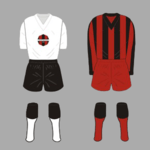
As a football team, in the years after Sportclub was created it competed in the Championship of Plovdiv. In the early years of Bulgarian football there is no national football league and championships held on a regional level throughout a calendar year are the most prestigious tournaments across the country. Sportclub participates in the second division of the Championship of Plovdiv until 1933 when the team finishes first in the second division and is promoted to Plovdiv's top tier as of 1934. In 1936 Sportclub becomes the Champion of Plovdiv for the first time.
In 1938 the team joined the National Football Division - the countrywide football league formed a year earlier that included Bulgaria's top ten teams. However, after only three seasons in 1940 the tournament is disbanded because of the Bulgaria's participation in World War II (WW2). By that time the club had changed its name to Plovdivski Sportclub (meaning Sportclub of Plovdiv) since several other teams in the country also had Sportclub in their name.
During the years of WW2, the team participates in several other tournaments including the Tsar's Cup considered Bulgaria's most prestigious knock-out tournament at the time and a predecessor of the current domestic cup tournament. In the Tsar's Cup the team reaches the finals twice - in 1940 and in 1942.
Since its establishment in 1926 up to the beginning of the communist rule in Bulgaria in 1944 Sportclub has become one of the best performing teams in the country with a constant participation in the final phases of the most prestigious tournaments. By 1944 the team is the biggest in the region of Plovdiv in terms of members, and has a dedicated following with its fans setting records for the period in attendance of football matches.
The Club of the Railway Workers in Plovdiv
In the mid-1930s the labour union of the railway workers and sailors establishes several cultural and sporting organisations across the country. The railway workers established their sports club in Plovdiv as well, since the city is one of the major travel centres in the country. On 13 June 1935 the club ZSK Plovdiv was founded, abbreviated from Zheleznicharski Sporten Klub Plovdiv meaning the sporting club of the railway workers in Plovdiv.
The first years of the team are difficult as its performance does not bring about such glory as some of the other teams of the city like Sportclub or Botev Plovdiv. The club is accepted as a member of the national sport federation a whole three years after its creation. Nevertheless, in the early 1940s the team betters their performance and in 1944 wins the Championship of Plovdiv.
In an economical aspect the railway club contributes heavily to the development of sports in the region of Plovdiv, making large inputs for the improvement of sporting conditions in the city. Most notably, the powerful national railway company through ZSK Plovdiv is the main benefactor for the creation of a state-of-the-art multi-purpose stadium in the city that opens in 1943. The stadium is constructed on the football pitches of the team of Levski Plovdiv and as such is the home grounds for both ZSK Plovdiv and Levski Plovdiv. As a result, the stadium is named "ZSK-Levski".
Creation of Lokomotiv (1944-1955)
Changes in Sportclub
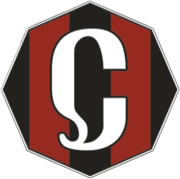
In the years after 1944, the newly established communist rule embarks in several campaigns for "reorganisation of the sporting clubs in Bulgaria" so that they are aligned with the political agenda and follow the "Soviet model". This means that every area should have a sports club, but in order to make investments more efficient for a greater member-base only a few clubs are allowed per area. The result is a forceful merger of clubs and teams.
Thus, starting from 1944 Sportclub is merged with numerous sports teams in the same district of Plovdiv due to the "reorganization". Being from an area with a population comprised by a variety of ethnic and religious backgrounds, the club is first merged with several lower-division so-called "Aremenian", teams such as Shant and Erevan. Another merger follows in 1945 with the "Catholic" club Parchevich. After this wave of mergers, like many others in the country, the club is renamed to an abbreviation of the biggest clubs merged - the new name is "S.P.-45", meaning Sportclub Parchevich - 1945. However, because of the "Western" phrasing ("sport" and "club" are non-Slavic words) the team is renamed again before the start of the season - the name of the club becomes "Slavia" Plovdiv.
In 1947 a new wave of consolidations of the sport organisations in the country sees Slavia Plovdiv merge with the team of the cooperative workers - Petar Chengelov. The merger creates the club Slavia-Chengelov.
Through all these mergers, the club originally named Sportclub keeps its colours and the core of its team, with only several players from the incorporated squads finding a place in the first team of the "new" club. As for the fans, the supporters of Sportclub remain loyal to the colours and the players, and the followers of the assimilated clubs join them, increasing even further the number of fans and members of the largest club in Plovdiv at that time. Though technically the clubs merge, because of the size of Sportclub in terms of members, the smaller clubs are assimilated into the black-white-and-red club.
During the period 1944-1955, the club reaches the final of the domestic cup (at that time being the Cup of the Soviet Army) for the third time in its history - in 1948 as Slavia-Chengelov. In season 1948 the club was one of the ten founder teams of the new national top league - "A" Republican Football Group (A RFG) - the predecessor of the current Bulgarian top division league .
Changes in ZSK
For ZSK Plovdiv the "reorganisation of sport clubs" in line with the Soviet model begins in the autumn of 1944. The club is merged with the team with which it shares a stadium - Levski Plovdiv, forming ZSK-Levski in accordance with the trend. Still, unlike most other forced mergers at that time, the ZSK-Levski merger is dissolved in only a year.
After the separation in 1945 ZSK is renamed to Lokomotiv (Plovdiv) similar to all other teams in the countries of the Eastern bloc connected in some way with the railways (such as Lokomotiv Sofia, Lokomotiv Moskva, Lokomotiv Leipzig, etc.) and Lokomotiv and Levski continue to co-exist as separate entities sharing the same stadium.
Although the club of the railway workers is financially backed by the solid national railway company, in the first years of the communist rule the football team competes merely on the third level of the recently formed national league. Furthermore, the club is the smallest in Plovdiv in terms of members and attracts a modest number of attendants for its games despite its state-of-the-art stadium.
Merger of Slaviya-Chengelov and Lokomotiv Plovdiv
In the summer of 1949 the Bulgarian Communist Party adopts a new principal governing the construction of sports clubs. According to the new political agenda, clubs must serve as the fitness departments of the politically important enterprises (such as the oil refineries, the police, the army, the national railway company, and others). Thus, the location of a club is no longer important and clubs must be assigned to the major institutions in the country.
The reorganisations of 1949 assigns Lokomotiv to assimilate Slavia-Chengelov, since Lokomotiv is already a team associated with a significant enterprise. Yet, at that time Slavia-Chengelov is the largest club in Bulgaria in terms of members, with an even larger fan-base. Hence, the smallest club in Plovdiv (namely Lokomotiv) has to assimilate one of the most popular teams in the country.
In October 1949, the formal "assimilation" of Slavia into Lokomotiv takes place to form DSO Energiya before season 1950. The club uses the colours of Slaviya-Chengelov (white, red, and black) for both the kits and the crest of the football team, and the team itself retains only four players from Lokomotiv - the core remains the players of Slaviya-Chengelov. Nevertheless, after more than two decades after the earthquake in 1928 the fans of what-was-once Sportclub have home grounds - the stadium of Lokomotiv.
DSO is an abbreviation meaning national sports organisation. However, just months after DSO Energiya is created changes in the names of clubs in the Soviet Union take place, inspiring the renaming of several clubs in Bulgaria. The popular at the time name for Eastern bloc sports clubs Torpedo is adapted for DSO Energiya - renamed Torpedo Plovdiv.
For season 1950 Torpedo Plovdiv takes the place of Slavia-Chengelov in the top level of the Bulgarian football league system (A RFG). Yet, during the season it becomes clear that the club will undergo some more changes because of the policy that as part of the railway union club members have to be entirely members of the union. This includes all the players of the football team as well as the members of the sport club in general - the large number of members of Slavia-Chengelov which have nothing to do with the railways. Thus, in 1951 before the new season begins, the railway union establishes a new club by the name of DSO Lokomotiv (Plovdiv) which will use the same colours for its football team as Torpedo and will play on the same stadium. The union also transfers all the players of Torpedo in DSO Lokomotiv and in order to make them official union members each player is de jure employed in the national railways. Meanwhile, Torpedo Plovdiv is taken out of the labour union and is no longer funded by it or the railway company. DSO Lokomotiv also acquires the license of Torpedo to play in the top tier of the Bulgarian football league, while Torpedo itself is relegated to the third division of the league due to the lack of license. By creating the new club and employing the team in the railways, the labour union effectively legitimises the club without the need to limit the access of members of Torpedo to the sports facilities. Members of Torpedo can still use the facilities which are shared between the two clubs and it is not necessary for them to be members of the railway union.
From the start of season 1951 the fans of the team of Torpedo Plovdiv in 1950 are supporting the same team with the same colours on the same grounds but named DSO Lokomotiv Plovdiv. As official membership in the club requires a job in the railways, the official number of members of the club are drastically smaller than the members of Torpedo in 1950. Nevertheless, the supporters of the team remain the same. Hence, in 1951 DSO Lokomotiv is the effective successor of Torpedo even though the club Torpedo continues to exist.
From 1951 to 1954 the team is one of the best performers in the football elite, annually reaching at least the quarter-final phase of both the domestic cup competition (at that time recognised to be the Cup of the Soviet Army) and the top division league.
First Relegation from the Elite (1955-1960)
In 1955 the team of DSO Lokomotiv is entirely changed - many key players are sold and the team seems to be unable to collaborate. In result, in season 1955 DSO Lokomotiv is relegated to the second division of Bulgarian football. For the fans the next season would be the first time their team plays outside the most prestigious echelon of Bulgarian football.
DSO Lokomotiv plays in second division for five seasons until it earns its promotion back to the elite for season 1961-62. In the same year, 1960, the team reaches the final of the domestic cup for the fourth time in its history (after 1940 and 1942 as Sportclub, and 1948 as Slaviya-Chengelov) but for the fourth time - it lost.
During its stay in the second division, the club experiences again the reorganisation of sports politics in the People's Republic of Bulgaria that took place in 1957. According to the changes, clubs no longer needed to be affiliated to enterprises and instead the emphasis turned back to the territorial principle. Thus, sport clubs no longer needed to be "DSO" (abbreviation meaning "voluntary sports organisation") inside the principal. Rather, as a club with many supporters in its area, DSO Lokomotiv assimilated the clubs Torpedo Plovdiv (with which it still shared a stadium) and Septemvri (Plovdiv). As the club no longer needed to be "DSO" it changed its name to "Lokomotiv" Plovdiv'.
Success Home and Abroad (1960-1985)
After re-entering the elite (A RFG) in 1961, it takes Lokomotiv seven years to reach top 3 and get a medal in season 1968-69.
On an international level however, the team achieves success much quicker. In season 1964-65, Lokomotiv Plovdiv reaches the Third Round of the Inter-Cities Fairs Cup, where after two draws with the legendary team of Juventus with Omar Sívori, Luis del Sol and Sandro Salvadore in their squad (each ending with a score 1:1), a third play-off match is chosen by UEFA to be played in Torino. The game is lost by "Loko" with a score of 2:1.
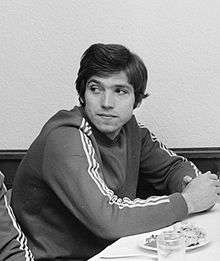
Before reaching the Third Round of the international football competition, the "Smurfs" have eliminated the Serbian FK Vojvodina and the Romanian FC Petrolul Ploieşti. Key players during this period include forward Gocho Vasilev, midfielder Hristo Bonev, defender Ivan Boyadzhiev and goalkeeper Stancho Bonchev.
In 1971, the team reaches the final of the domestic cup again and again lost it, this time to Levski Sofia with a score of 3:0.
In 1973, Lokomotiv wins the silver medals of A RFG, finishing the season with 43 points, 7 less than the first, CSKA Sofia. The following year, another celebration is in order - in 1974 Lokomotiv finished the season in the third place getting the league bronze. In the following few years period the team is quite stable and it was very rarely standing under the 6th position in the league table. Among the team's players is Hristo Bonev - considered by most Loko fans as being the greatest player of the club ever, and one of the greatest Bulgarian players.
When after season 1979-80 Lokomotiv Plovdiv is again relegated to Bulgaria's second football division, it takes the team three seasons to earn its place back in the football elite.
Despite being in second division between 1981 and 1983, Loko reaches the final of the Cup of the Soviet Army twice. In 1982 for the sixth time the team cannot win the domestic cup. In 1983 however, led by Hristo Bonev, Lokomotiv won their first national cup beating FC Chirpan 3:1 at Vasil Levski National Stadium in Sofia on 1 June. (Be that as it may, it is important to note that the tournament of the Cup of the Soviet Army, held annually between 1946-1990, is recognised by the Bulgarian Football Union(BFU) as the domestic cup tournament up to 1982. In 1981, the tournament for the Bulgarian Cup begins to take place every year and rises in prestige, overtaking the significance of the Cup of the Soviet Army in sequent years. At present, the BFU's official statement is that it considers the Bulgarian Cup to represent the domestic cup from 1983 onwards. Thus, nowadays the Cup of the Soviet Army won in 1983 by Lokomotiv Plovdiv is the first officially non-recognised as the domestic cup Soviet Army trophy; i.e. Lokomotiv Plovdiv is not officially recognised as the bearer of the domestic cup for 1983 - it is a non-official bearer. Yet, at that time, the Soviet Army Cup was for all intents and purposes, is the domestic football cup trophy.)
In 1982 the team acquired a new stadium situated in park "Lauta" near the city's newest district. "Lokomotiv" Stadium is part of a sports complex used by the other teams of the sports club (such as the volleyball and the boxing teams of "Lokomotiv" Plovdiv. In season 1983-84, even though the club has just been promoted to the top division, and in defiance of being the Soviet Army Cup holder, Loko Plovdiv relegates itself again and plays season 1984-85 in the lower level of the Bulgarian league system. In 1985 the team earns it promotion back to A RFG.
1985-2000
After its return to the top division in 1985 the team makes a steady performance for over a decade, placing itself in the middle of the league table until the late 1990s. During that time the team finishes in top 3 only once - in season 1991-92.
In the late 1990s the form of the team worsens which takes them out of the elite again, and in seasons 1998-99 and 1999-00 Lokomotiv Plovdiv plays in B PFG.
Georgi Iliev Years (2000-2004)
In 2000 the club is bought by Georgi Iliev. At that time, Iliev owns another football club - Velbazhd Kyustendil. The team from Kyustendil has a very good performance in the Bulgarian top division (A PFG) finishing in third place three consecutive seasons until 2000-01 and is a national cup runner-up in 2001.
In season 2001-02 Iliev decides to merge the two teams creating the contemporary Lokomotiv Plovdiv (full name: Professional Football Club Lokomotiv 1926 Plovdiv). The new club is based in the grounds of the Lokomotiv that merged with Velbazhd, uses the same colours and is the official successor of that club. Yet, the team was formed almost entirely of the players performing excellently in the last years in the club from Kyustendil. As a result, that team finished third again at the end of the season.
The most successful season in the club's history was the 2003-04 campaign. Lokomotiv won the title, the first and so far the only in the club's history. The coach, Bulgarian Eduard Eranosyan, formerly football player of the team started the 2003–04 well, with Lokomotiv leading the league by six points halfway through the season and remaining unbeaten. In the penultimate, 29th round, The Smurfs defeated Slavia Sofia in Plovdiv by 3:2 in front of more than 17,000 spectators, and Lokomotiv won the Bulgarian championship. Lokomotiv finished the season with 75 points, 3 more than the second, Levski Sofia. In the team lines was recent acquisition Martin Kamburov who became the goalscorer in Bulgaria with 26 goals. Key players during the fantastic season included Vasil Kamburov, Georgi Iliev, Aleksandar Tunchev, Kiril Kotev, Vladimir Ivanov, Metodi Stoynev and the Macedonians Boban Jančevski, Vančo Trajanov and Robert Petrov.
A few months later, the team played for the first time in the UEFA Champions League qualifying rounds where they faced Club Brugge from Belgium in the second qualifying round.
The same year, Lokomotiv won the Bulgarian Supercup, after beating Litex Lovech. In the final, Ivan Paskov scored a brilliant header in the last seconds of the game for the 1:0 win.
Recent history (2004-present)
The next 2004-05 season in the domestic league was also very successful for the team, which finished 3rd in A PFG, and qualified for the UEFA Cup. In the European club competition, Lokomotiv defeated Serbian OFK Beograd in the second qualifying round (1:0 home win and 1:2 away loss) and were drawn to play against the English Bolton Wanderers in the first round. However, the team from Plovdiv was eliminated after a 1-2 loss at the Reebok Stadium in Bolton and another 1-2 loss in a match, played at the Lazur Stadium in Burgas.[1]
In the next few months the club had big financial problems. Because of these problems, many of the players of the champions team, as Aleksandar Tunchev, Martin Kamburov, Ivan Paskov, Georgi Iliev, Darko Spalević, Kiril Kotev and Boban Jančevski left the club.
In the 2005-06 season Lokomotiv finished 5th in A PFG and qualified for the Intertoto Cup. Loko were eliminated with a 2-3 (1-2 away loss and a 1-1 home draw) on aggregate by Romanian Farul Constanţa.
In the next three seasons, the team finished in the middle of the table. In December 2009, the businessman and ex-Vihren Sandanski owner Konstantin Dinev acquired the club from Galina Topalova in a 2 million euro bid, with the clear intention to bring Loko back to European club competition.
Crest and colors
The configuration of the crest consists of a shield colored in red and black and a golden letter 'L' (in Bulgarian: 'Л') placed in the center. A white stripe with inscription 'Plovdiv' is positioned on the upper part of the shield. The wings in the bottom of the shield represent the historical bond between the football club and the national railway company.
Lokomotiv Plovdiv's traditional home colors are white, black and red. In the past the club has also adopted a sky blue as a kit color.

1926 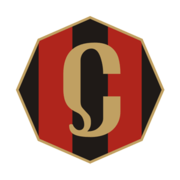
1945 
1949 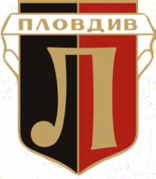
1951 
1970 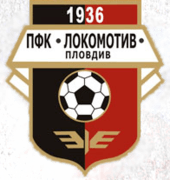
1985 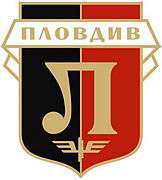
2011
Honours
- Runners-up (4 [7†]): 1960, 1971, 1982, 2012; [1940 (as Sportclub), 1942 (as Sportclub), 1948 (as Slaviya-Chengelov)]
- Winners (1): 1983
†: Accomplishments in tournaments before 1949 are not officially recognised by the BFU as accomplishments by Lokomotiv Plovdiv.
Support

Since its foundation, Lokomotiv has been one of the best supported football clubs in Bulgaria. In the early years of Bulgarian football the team's fans broke attendance records on numerous occasions,[2] even though many times the conditions were not at all hospitable (since 1928 the team did not have a home ground for more than 20 years).[3] By the 1940s the club was one of the largest in the country in terms officially registered members.[4] In 1968 supporters of the team established the amateur football club Friends of Lokomotiv Plovdiv as a means of organised support for the team, and in 1988 the official fan-club of the team - Club of the Supporters of Lokomotiv Plovdiv - was established as the first of its kind in Bulgaria. It has to be noted that the political setting (the regime) of the time was unfavourable towards independently formed organisations.[5] In recent years, the team's fans have organised an amateur football tournament called Liga Lauta the proceedings from which go for the club's youth academy.[6] Organisers intend the extend the initiative to an annual tournament.
As of the start of the reconstruction project of Lokomotiv Stadium, the club's fans decided to give an official name to the sector that is to contain the fiercest team supporters. The home of the factions was chosen to be called Bessica Tribune (after the name of the ancient Thracian tribe whose artefacts were discovered in the surroundings of the stadium), but since the project has been put on hold the name Bessica Tribune has been used as a collective name for the most dedicated followers. Lokomotiv Plovdiv also has a well-recognised football hooligan fan base. Some of the most prominent factions are Lauta Hools, Got Mitt Uns, Napoletani 1995, and Lauta Youths.
Lauta Hools, also called Usual suspects, founded in 1994, adhere to the British way of support and are casuals, and it is not uncommon to see the Union Jack in the stands as a result.[7]
Rivalries
Lokomotiv's main rival is the neighbouring club of Botev Plovdiv forming the Plovdiv derby. The two teams are the most supported ones in the second largest city in Bulgaria. Botev is one the country's oldest teams, whereas Lokomotiv grew popular in the 70s. Traditionally, Lokomotiv's drew support from the lower working classes of society whereas Botev drew support form the middle and upper classes, although that no longer applies.[8]
Another rivalry Lokomotiv Plovdiv has is with one of Bulgaria's most successful football clubs - CSKA Sofia. The rivalry has a geopolitical nuance, first because of the historical competition between the cities of Plovdiv and Sofia as cultural, political and economical centres, and second because of the association of CSKA with the Bulgarian Army same as rival Botev Plovdiv.
A rather friendly rivalry the team from Plovdiv has is with "sister" team of Lokomotiv Sofia. The teams are historically connected because of their historical positions as the teams of the railway workers of Plovdiv and Sofia. They are the most successful and supported clubs railway workers in Bulgaria were connected to so matches between the teams are often called The Railroaders' Derby. However, the teams were never direct competitors for the title and supporters never had massive confrontations, hence the derby is rather friendly.
Friendships
The Lokomotiv fans have a long-standing friendship with fans of Italian team SSC Napoli. Napoli gave birth to the name Napoletani Ultras Plovdiv and that is how the friendship arose.
Current squad
As of 7 August 2017
Note: Flags indicate national team as defined under FIFA eligibility rules. Players may hold more than one non-FIFA nationality.
|
|
For recent transfers, see Transfers summer 2017.
Out on loan
Note: Flags indicate national team as defined under FIFA eligibility rules. Players may hold more than one non-FIFA nationality.
|
Foreign players
Up to three non-EU nationals can be registered and given a squad number for the first team in the A PFG. Those non-EU nationals with European ancestry can claim citizenship from the nation their ancestors came from. If a player does not have European ancestry he can claim Bulgarian citizenship after playing in Bulgaria for 5 years.
|
EU Nationals |
EU Nationals (Dual citizenship) |
Non-EU Nationals |
Retired numbers
8 - ![]() Hristo Bonev, striker (1963–67, 1968–79, 1982–84)
Hristo Bonev, striker (1963–67, 1968–79, 1982–84)
Managerial history
|
|
[9] As of 20 May 2014
Notable players
For a complete list of Lokomotiv Plovdiv players, see Category:PFC Lokomotiv Plovdiv players.
Recent seasons
League positions

| Season | Tier | Position | M | W | D | L | G | D | P | Bulgarian Cup | Notes |
|---|---|---|---|---|---|---|---|---|---|---|---|
| 2005-06 | A Group | 5 | 28 | 11 | 7 | 10 | 43 | +1 | 40 | Round of 32 | |
| 2006-07 | A Group | 7 | 30 | 13 | 4 | 13 | 47 | +4 | 43 | Semi-final | |
| 2007-08 | A Group | 9 | 30 | 12 | 7 | 11 | 37 | +9 | 43 | Quarter-finals | |
| 2008-09 | A Group | 6 | 30 | 12 | 7 | 11 | 40 | -3 | 43 | Round of 32 | |
| 2009-10 | A Group | 12 | 30 | 9 | 6 | 15 | 36 | -16 | 33 | Round of 32 | |
| 2010-11 | A Group | 5 | 30 | 14 | 10 | 6 | 54 | +26 | 52 | Quarter-finals | |
| 2011-12 | A Group | 6 | 30 | 17 | 6 | 7 | 44 | +5 | 57 | Runner-Up | 2012 Bulgarian Supercup Runner-Up |
| 2012-13 | A Group | 9 | 30 | 10 | 9 | 11 | 37 | +3 | 39 | Round of 32 | |
| 2013-14 | A Group | 7 | 38 | 15 | 5 | 18 | 49 | -6 | 50 | Semi-final | |
| 2014-15 | A Group | 10 | 32 | 9 | 5 | 18 | 28 | -24 | 32 | Semi-final | |
| 2015-16 | A Group | 5 | 32 | 15 | 4 | 14 | 40 | -5 | 49 | Round of 16 | |
| 2016-17 | First League | 5 | 36 | 14 | 10 | 12 | 50 | -2 | 52 | Quarter-finals |
UEFA ranking
| Rank | Country | Team | Points |
|---|---|---|---|
| 338 | FC Chikhura Sachkhere | 3.125 | |
| 339 | FC Metalurgi Rustavi | 3.125 | |
| 340 | PFC Lokomotiv Plovdiv | 3.125 | |
| 341 | FC Shirak | 3.075 | |
| 342 | FC Zhetysu Taldykorgan | 3.075 |
Updated: 12 Dec 2015 UEFA Club Coefficients
References
- ↑ "Bolton 2-1 Lokomotiv Plovdiv". BBC News. 15 September 2005. Retrieved 2005-09-15.
- ↑ "МНОГОБРОЙНИ ПРИВЪРЖЕНИЦИ, ЧАСТ ВТОРА: ДЕСАНТИТЕ В ЧЕРНО-БЯЛО-ЧЕРВЕНО" [Numerous Supporters, Part Two: The Raids in Black-White-and-Red] (in Bulgarian). 13 Aug 2013. Retrieved 9 May 2014.
- ↑ "ИСТОРИЯТА НА ЛОКОМОТИВ ПЛОВДИВ" [The History of Lokomotiv Plovdiv] (in Bulgarian). 28 Apr 2010. Retrieved 9 May 2014.
- ↑ "ИСТОРИЯТА НА ЛОКОМОТИВ ПЛОВДИВ" [The History of Lokomotiv Plovdiv] (in Bulgarian). 28 Apr 2010. Retrieved 9 May 2014.
- ↑ "25 ГОДИНИ КЛУБ НА ПРИВЪРЖЕНИЦИТЕ НА ЛОКОМОТИВ ПЛОВДИВ" [25 Years Club of the Supporters of Lokomotiv Plovdiv] (in Bulgarian). 10 May 2013. Retrieved 9 May 2014.
- ↑ "Сезонът на "Лига Лаута" приключва тази седмица" [Liga Lauta Season Ends This Week] (in Bulgarian). 21 Apr 2014. Retrieved 9 May 2014.
- ↑ http://lautahools.org/?lang=en
- ↑ http://www.footballderbies.com/honours/index.php?id=81
- ↑ http://www.loko-pd.com/statistics/
External links
| Wikimedia Commons has media related to PFC Lokomotiv Plovdiv. |
- Official website (in Bulgarian)
- Official fan-website (in Bulgarian)
- Historical fan-website (in Bulgarian)
- Official Facebook page (in Bulgarian)
